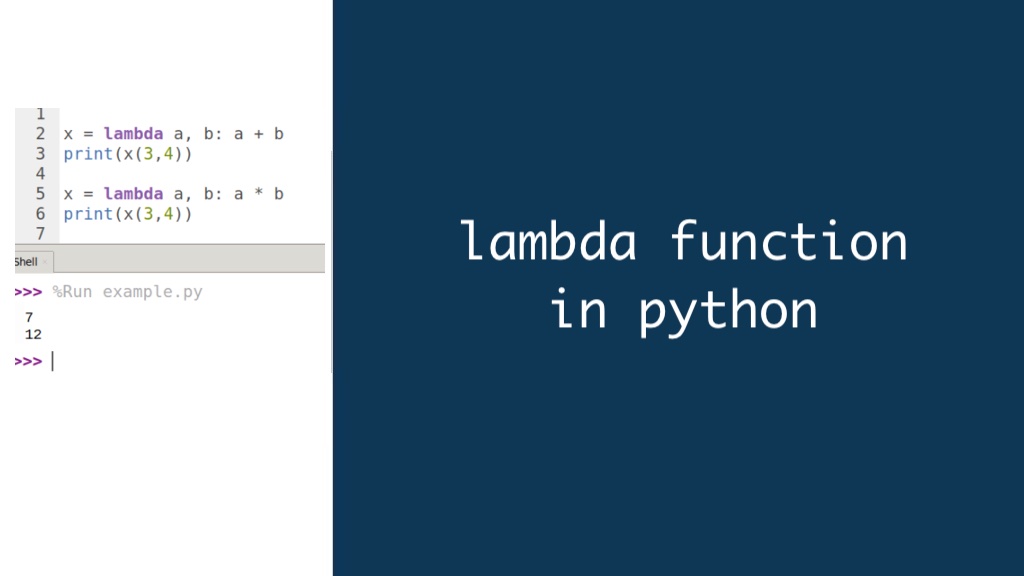Python, a versatile programming language beloved for its readability and extensive libraries, offers a powerful tool for concise and elegant code: lambda functions. Often referred to as anonymous functions, lambda functions allow you to define a small, one-line function without the need for a formal function definition using def.
Understanding Lambda Syntax
The syntax for a lambda function is delightfully straightforward:
lambda arguments: expressionHere’s a breakdown of the components:
lambda: This keyword signals the creation of an anonymous function.arguments: This optional section represents a comma-separated list of arguments the function can accept. A lambda function can take zero or more arguments.expression: This is the heart of the function, containing the code that will be executed when the function is called. The expression ultimately returns a value.
For instance, here’s a lambda function that squares a number:
square = lambda x: x * x # Assigns the lambda function to a variable 'square'
result = square(5) # Calls the function with argument 5 and stores the result in 'result'
print(result) # Output: 25In this example, x acts as the argument, and x * x is the expression that is evaluated and returned when the function is called with the value 5.
Basics: Common Use Cases for Lambda Functions
Let’s explore some common use cases for lambda functions:
- Simple Calculations: Need to quickly square a number? Lambda functions make it a breeze:
square = lambda x: x * x
result = square(5) # result will be 25- Sorting Lists: Sorting a list based on a specific criterion becomes effortless with lambda functions:
numbers = [3, 1, 4, 5, 2]
sorted_numbers = sorted(numbers, key=lambda x: x % 2) # sorts based on remainders when divided by 2
print(sorted_numbers) # Output: [2, 4, 1, 3, 5]- Filtering Data: Lambda functions are adept at filtering elements within a list based on a condition:
fruits = ["apple", "banana", "orange", "cherry"]
filtered_fruits = list(filter(lambda fruit: len(fruit) > 5, fruits)) # filters fruits with length greater than 5
print(filtered_fruits) # Output: ["banana", "orange"]These are just a few examples, and the possibilities are vast. Lambda functions can be used for various tasks, from string manipulations to complex data transformations, as long as they can be expressed in a single line of code.
Advantages and Trade-Offs: When to Embrace Lambdas
Lambda functions offer several advantages:
- Conciseness: They promote concise code, especially for simple operations, making your code more readable and maintainable.
- Readability: When used appropriately, lambda functions can enhance code readability by encapsulating small, well-defined logic blocks.
- Versatility: Their ability to act as arguments to other functions opens up various possibilities for creating flexible and dynamic code.
However, it’s important to consider potential drawbacks:
- Complexity: Overusing lambda functions for complex logic can lead to less readable and maintainable code.
- Limited Scope: Lambda functions have limited scope and cannot access variables outside their enclosing scope.
- Debugging Challenges: Debugging lambda functions can sometimes be trickier compared to regular functions due to their concise nature.
As a general rule, if the logic you want to express is complex or requires accessing variables outside its scope, a regular function definition might be a better choice.
Exploring Advanced Lambda Function Techniques
As you progress in your Python journey, you might encounter more advanced applications of lambda functions:
- Decorators: Lambda functions can be used to create simple decorators that modify the behavior of existing functions.
- Nested Lambda Functions: While not the most common practice, you can even nest lambda functions for more intricate logic within a single line (use with caution for readability).
The Power of Compactness: Mastering Lambda Functions
Lambda functions are a valuable tool in your Pythonic arsenal. By understanding their syntax, common use cases, and trade-offs, you can leverage their power to write concise, readable, and versatile code. Remember, use them judiciously to keep your code clean and maintainable. As your Pythonic journey progresses, lambda functions will become a natural extension of your problem-solving toolkit!
